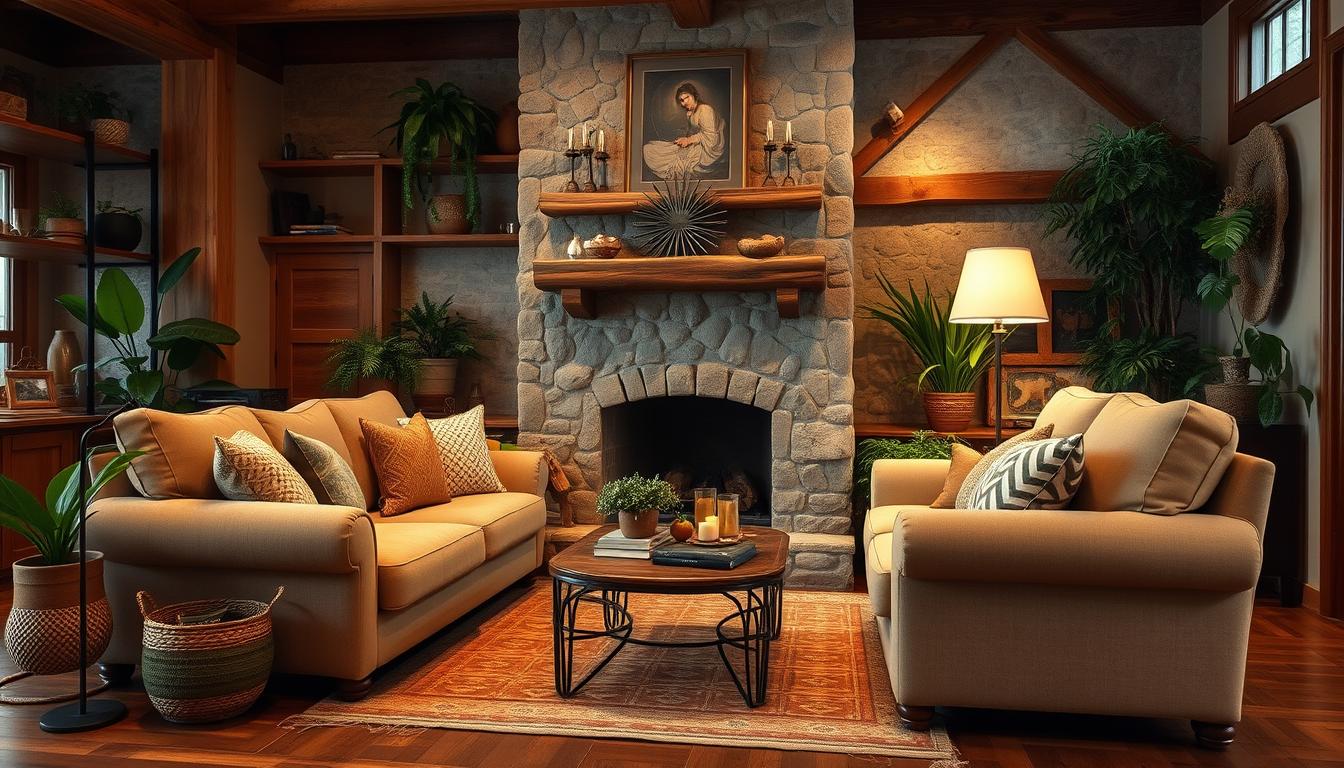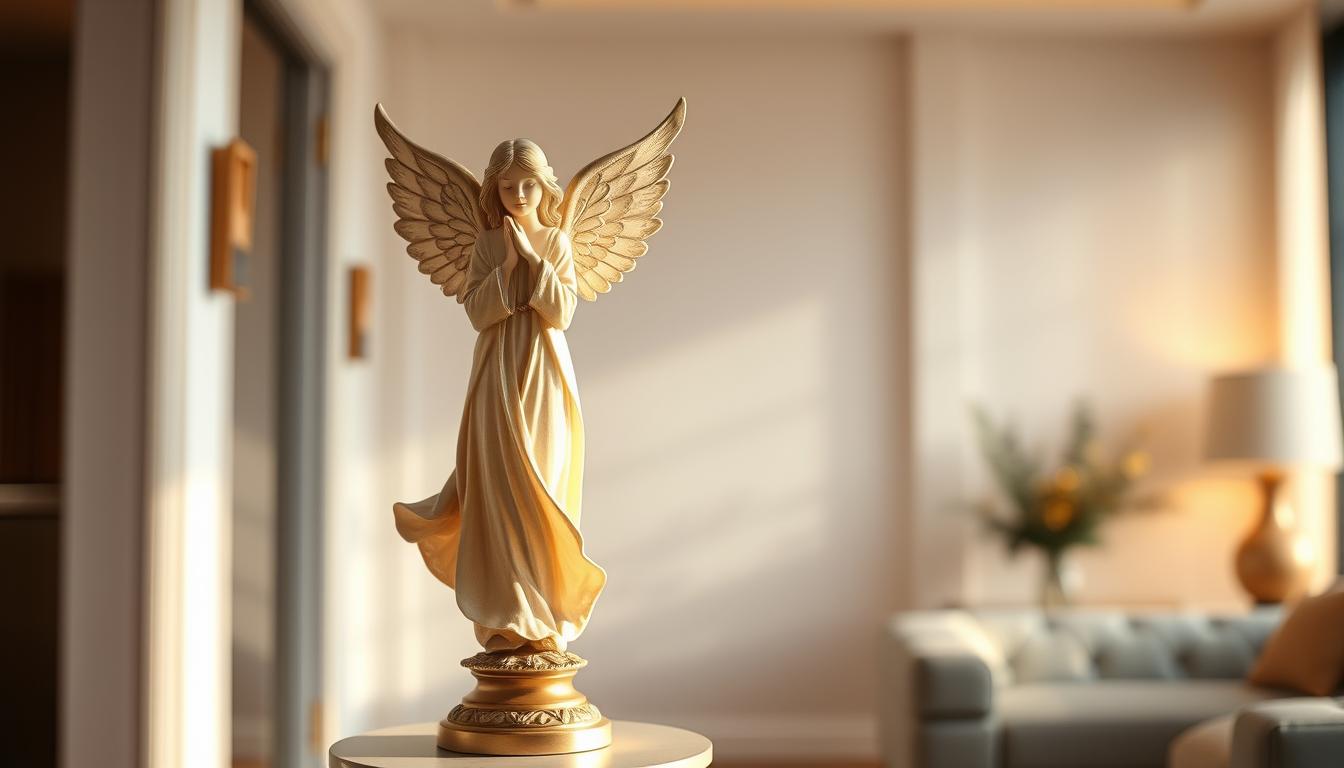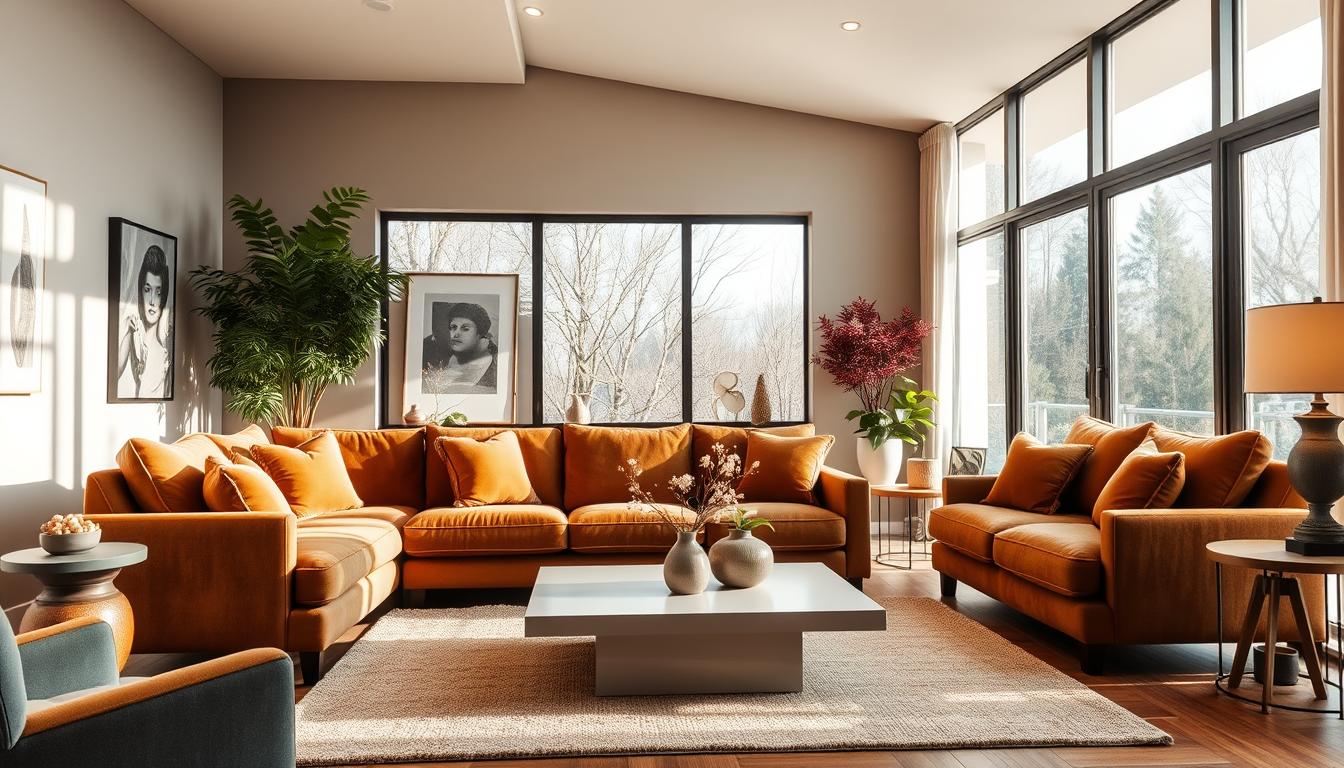Did you know the right interior design trends can make you happier and more productive? With more time at home than ever, making your space reflect you is key.
We’ll look at the top home interior styles for your space. We’ll cover the latest interior design trends to make your space beautiful and useful. Whether it’s a single room or your whole home, we’ve got the inspiration and advice you need.
Key Takeaways
- Discover the latest interior design trends to inspire your space
- Learn how to choose the perfect home interior style for your lifestyle
- Explore tips for creating a functional and beautiful space
- Understand the importance of reflecting your personality in your home decor
- Get guidance on how to refresh a single room or redesign your entire home
Understanding Home Interior Styles
Our home’s interior style shows who we are and how we live. There are many styles, from modern to traditional. It’s key to know what makes each style unique and why picking the right one is important.
What Defines Home Interior Styles?
Home interior styles are shaped by furniture, colors, lighting, and decor. For example, modern home decor ideas have sleek lines and focus on function. In contrast, traditional home interiors use classic furniture, rich colors, and detailed designs.
The style of our home shows our taste and affects our space’s feel and use. Knowing what makes different styles unique helps us design our homes better.
The Importance of Choosing the Right Style
Choosing the right home style is vital. It changes how we feel and use our homes. The right style can boost our mood and make our space more functional.
For instance, a modern style can bring calm, while a traditional style warms our home. The right style can also raise our home’s value. Adding trendy elements like sustainable materials or smart tech can attract buyers if we sell.
Popular Home Interior Styles
Choosing the right interior style for our homes is key to the ambiance. With many styles available, picking the perfect one can be tough. Let’s look at some popular styles that can change our living spaces.
Modern Style: Sleek and Functional
Modern design is all about clean lines, less decoration, and being practical. It uses contemporary interior design like open layouts and lots of natural light. Modern homes stick to simple colors but add bold touches for interest.
Traditional Style: Timeless Elegance
Traditional design is warm and elegant, inspired by classic European styles. It uses rich colors, fancy furniture, and detailed patterns. Traditional homes often have rustic home decor like wooden beams and fireplaces, making them cozy.
Bohemian Style: Vibrant and Eclectic
Bohemian design is all about being yourself and creative. It mixes old and new, bright colors, and different patterns. Bohemian homes are full of unique items, showing off the owner’s personality and travels.
Industrial Style: Urban and Edgy
Industrial design is popular for its urban feel. It features exposed brick, metal, and concrete. Industrial homes are simple, with a focus on useful items and calm colors.
Knowing about these styles helps us find the one that fits our taste. Whether you like modern’s sleekness or traditional’s warmth, there’s a style for everyone.
Minimalist Design: Less is More
Minimalist design is all about simplicity and connecting with nature. It’s inspired by Scandinavian homes. This style is loved for making spaces calm and useful.
Key Features of Minimalism
Minimalist interiors have clean lines and minimal ornamentation. They also use a neutral color palette. These features help create a calm atmosphere and reduce clutter.
- Simple shapes and forms
- Monochromatic or limited color schemes
- Use of natural materials like wood and stone
- Emphasis on negative space
Benefits of Minimalist Interiors
Minimalist design has many benefits. It reduces clutter, brings calm, and makes spaces more functional. By keeping only what’s essential, we make our homes more organized and beautiful.
| Benefits | Description |
|---|---|
| Reduced Clutter | Minimalist design encourages us to eliminate unnecessary items, resulting in a clutter-free environment. |
| Increased Sense of Calm | The simplicity and serenity of minimalist spaces can promote relaxation and reduce stress. |
| Improved Functionality | By focusing on essential elements, minimalist design can improve the functionality of our living spaces. |
In conclusion, minimalist design is a fresh way to decorate homes. It values simplicity, functionality, and nature. By following minimalist principles, we can make our homes peaceful and useful, just like Scandinavian homes.
Rustic Charm: Embracing Nature
The rustic charm celebrates the beauty of nature in our homes. It uses natural materials and earthy tones to make spaces warm and inviting. Like the bohemian interior style, rustic charm adds organic elegance to our homes.
Elements of Rustic Design
Rustic design focuses on natural elements and a cozy feel. Key elements include:
- Natural materials like wood, stone, and brick
- Earthy colors that reflect nature
- Textiles like wool and linen for warmth and texture
- Vintage or antique pieces for character and history
These elements create a warm and cozy atmosphere. Our homes feel like a retreat from the world outside.
Popular Rustic Materials
The choice of materials is key in rustic design. Some top picks are:
| Material | Characteristics | Uses |
|---|---|---|
| Wood | Warmth, durability, versatility | Flooring, furniture, wall paneling |
| Stone | Natural beauty, strength, variety | Fireplaces, wall cladding, flooring |
| Brick | Classic appeal, durability, insulation | Wall construction, fireplaces, outdoor kitchens |
Using these materials brings rustic charm to our homes. It makes our spaces authentic and inviting. Whether renovating or building a new home, natural materials and earthy tones create a warm, welcoming environment.
Contemporary vs. Modern: What’s the Difference?
In interior design, contemporary and modern styles are not just terms. They show different ways to decorate. Knowing the differences helps us choose the right style for our homes.
Characteristics of Contemporary Style
Contemporary style is about today’s trends in design. It’s always changing and uses the newest styles and tech. Contemporary interiors mix materials, textures, and colors for a unique look. For example, a modern living room might have metal, wood, and bright fabrics together.
Contemporary design loves open spaces and less clutter. It uses furniture that does more than one thing and smart storage. It also brings in the latest tech, like smart home devices, to make spaces better.
When to Choose Contemporary Over Modern
Choosing between contemporary and modern depends on what we like and our space’s needs. If we want the latest trends and flexibility, go for contemporary. It’s perfect for those who enjoy the differences between modern and contemporary.
| Style Element | Contemporary | Modern |
|---|---|---|
| Design Focus | Current trends, eclectic mix | Functional, minimalist |
| Furniture | Multi-functional, latest designs | Simple, clean lines |
| Color Scheme | Varied, often bold | Neutral, monochromatic |
Understanding the differences between contemporary and modern styles helps us design better homes. Our spaces can be both beautiful and practical.
Choosing a Style for Our Home
Finding the right look for our home starts with understanding our space, lifestyle, and what we like. Knowing these things helps us choose the best style for our home.
Assessing Our Space and Lifestyle
Choosing the right interior style means looking at our home and how we live. We need to think about our home’s design, the light it gets, and what we need. For example, a bright home can handle bold colors, while a dim one might need lighter tones to feel airy.
Our lifestyle also plays a big role. If we have a family or pets, we might want durable, easy-to-clean materials. If we work or like to read, we might want a cozy, quiet area for focus and relaxation.
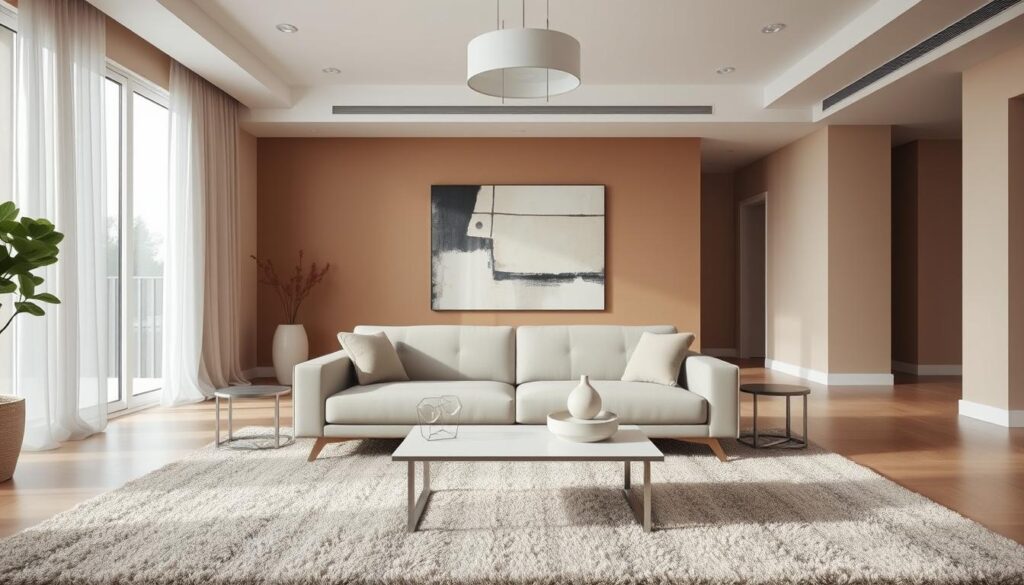
Popular Trends to Consider
After understanding our home and lifestyle, we can look at current trends for inspiration. Modern home decor ideas are all about simplicity, clean lines, and being practical. This style is great for those who love simplicity and elegance.
Traditional home interiors, on the other hand, are classic and warm. They feature timeless furniture, rich colors, and detailed designs. This style is perfect for those who cherish tradition and warmth in their homes.
When deciding between these styles or mixing them, it’s key to think about what we personally like. We should also consider the latest trends and how they might change in the future. This way, our choice will stay stylish and appealing for years to come.
Mixing and Matching Styles
Mixing home interior styles is a delicate art. It’s about finding the right balance between keeping things cohesive and adding creativity. This way, homeowners can make a space that truly reflects their personality and taste.
Tips for Successful Style Blending
To blend styles like contemporary and rustic, find a common thread. This could be a shared color, texture, or design element. This thread helps keep the space feeling connected.
- Start with a neutral base: Use a neutral color on walls and floors. This creates a calm background for different styles.
- Choose a unifying element: Pick something like a material or texture. This helps tie different styles together.
- Balance bold pieces with simpler ones: Pair a bold piece with simpler ones. This prevents the space from feeling too busy.
For more tips on mixing decor styles, check out this resource.
Avoiding Common Mistakes
Mixing styles can be rewarding, but there are pitfalls to watch out for. One big mistake is mixing too many styles. This can make the space feel cluttered and disjointed.
| Common Mistake | How to Avoid It |
|---|---|
| Mixing too many styles | Stick to two or three styles to keep things cohesive. |
| Ignoring the space’s purpose | Think about the room’s function and choose styles that support it. |
| Forgetting about balance | Make sure bold elements are balanced with more subtle ones. |
By avoiding these mistakes and following the tips, homeowners can blend styles successfully. This creates a unique and welcoming home.
Sustainable Interior Styles
In recent years, sustainable interior design has become more popular. It shows our growing commitment to the environment. When choosing home styles, using eco-friendly practices is key.
Sustainable design is not just about being green. It also makes our homes healthier. Scandinavian design, with its focus on minimalism and nature, leads the way.
Eco-Friendly Design Principles
Eco-friendly design is at the core of sustainable interiors. It helps us pick materials and products that are good for the planet. Using recycled materials is a big part of this.
- Reclaimed wood for furniture and flooring
- Recycled glass for countertops and decorative elements
- Sustainable textiles, such as organic cotton and hemp
Choosing these materials helps reduce waste. It also supports a more sustainable economy in design and construction.
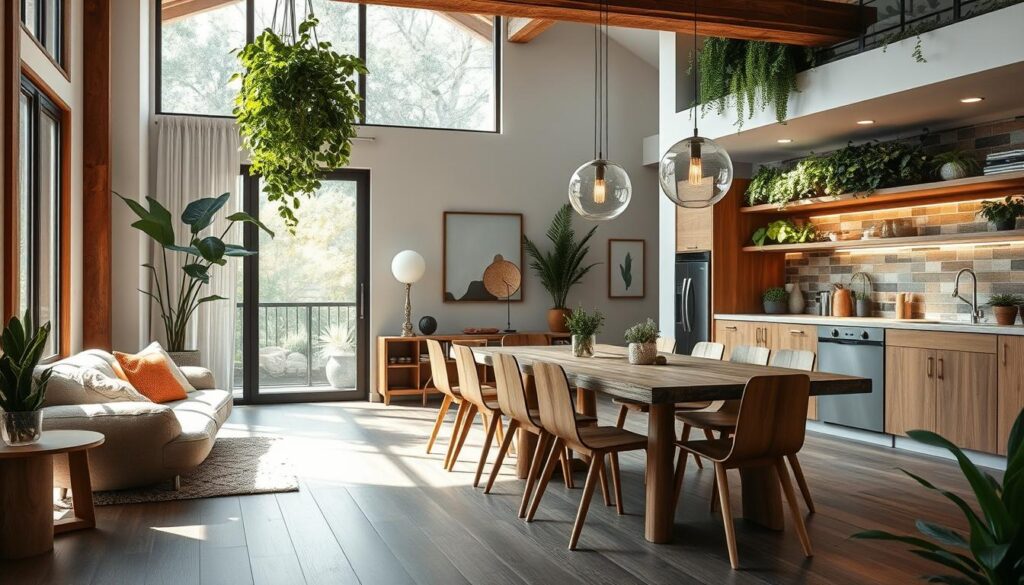
Key Elements of Sustainable Decor
Sustainable decor is more than just materials. It’s about creating a space that’s good for us and the planet. Key elements include:
| Element | Description | Benefit |
|---|---|---|
| Natural Light | Maximizing natural light with windows and mirrors | Reduces need for artificial light, cuts energy use |
| Eco-Friendly Paints | Paints with low or zero VOCs | Improves air quality, boosts health |
| Energy Efficiency | Using energy-efficient appliances and lights | Reduces energy use, lowers carbon footprint |
Scandinavian home design shows us the value of simplicity and function. By following these principles, we can build homes that are both beautiful and sustainable.
“The ultimate test of a moral society is the kind of world that it leaves to its children.” –
This quote highlights the importance of sustainable design. It reminds us of our duty to the next generation.
Choosing sustainable interior styles is a conscious decision. It’s about living in harmony with nature. It involves making smart choices about materials, energy, and design.
Adapting Styles for Different Rooms
It’s key to match interior styles with each room’s needs. This makes our homes both beautiful and practical.
A living room is where we host guests and bond with family. Adding a bohemian interior style can make it warm and unique. This style mixes vintage and global items, creating a cozy feel.
Style Ideas for Living Rooms
To get a bohemian vibe, mix vintage furniture with global items. Add plants and natural elements for a cozy feel. Use different textures and patterns to make it inviting.
For a modern twist, try interior design trends like sustainable materials. Use reclaimed wood, eco-friendly fabrics, and metallic accents for a sleek look.
Kitchen Style Trends
Kitchens need both style and function. Today’s interior design trends include bold colors and smart tech. Add statement lighting and unique backsplashes for interest.
Match your kitchen style with your home’s look. For modern, go for sleek surfaces and simple cabinetry. For traditional, use warm woods and classic fixtures.
Bedroom Decoration Tips
Bedrooms should be cozy and restful. The bohemian interior style works well here. Use plush rugs, soft bedding, and woven baskets for a snug feel.
Enhance the mood with soft lighting and personal items. For calmness, choose soothing colors and simple decor.
For more ideas on interior styles, visit Lia Interieur.
Conclusion: Finding Our Perfect Style
Exploring different home interior styles shows us our home reflects our personality. We can pick from modern, traditional, or bohemian styles to make a space that shows who we are.
Personalizing Our Space
Choosing elements that match our lifestyle and preferences is key. Whether it’s modern sleekness or rustic charm, our choices should make us feel right at home.
Transforming Our Space
We can start by looking at our current decor and finding what needs a change. Then, we can add modern or other styles that fit our dream. This way, we create a welcoming space that shows our unique taste.

